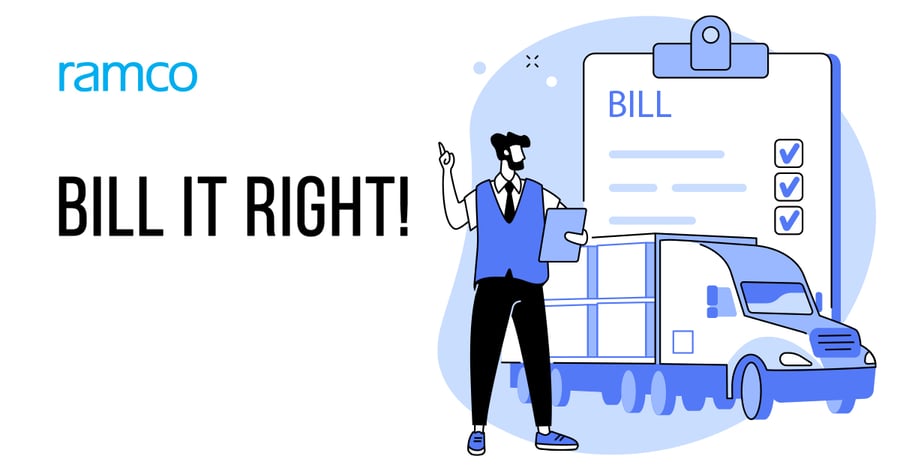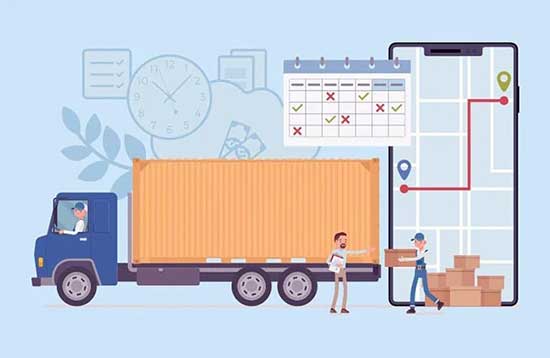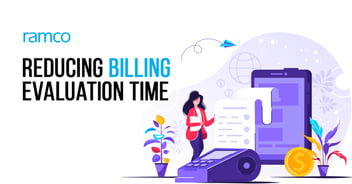

A Logistics Service Provider (LSP) has multiple operational nodes like Sales, Transportation, Warehouse Operations, Billing, and Finance. The billing department is considered as one of the critical nodes as they engage with customers and vendors to ensure that cash cycle flow is maintained at an optimal level. Additionally, it is important as it is about managing the account of your customers, and also since it has financial repercussions.
It is a well-known fact that Logistics businesses are complex and dynamic in nature, and when it comes to logistics billing, the same aspect is applicable, perhaps with multi-fold challenges. In a transportation business, for example, the customer order can have multiple bills – each leg of the order billed separately, freight advance cycle, exception billing in terms of penalty, execution advance, and expense cycle. When we couple these parameters with the business volume, billing becomes even more complex. Keeping track of transaction-level bills, which is critical for the business, then becomes a challenge. Similarly, in a warehouse business, at the customer location level, the billing models may vary – one customer may opt for warehouse activity-specific billing, and another may chose not to charge for activity, but to collectively bill only against the contract.
To cater to this complex business, every billing team has three vital challenges to handle during its billing cycle, which are:
- On-time and accurate bills/ invoices: In the world of LSP, each customer/ vendor may have different terms and conditions, so the key here is to align with the stakeholders’ billing cycle and raise the bills on time without any delays or follow-ups. Whenever bills are raised, the accuracy of the bills is another area of concern. Repercussion because of any of these factors may affect your business relationship with stakeholders.
- Validate the bills for payment: The volume of transactions in a medium-sized 3PL in an e-commerce business cycle is enormous, and it consumes a huge amount of time to validate the correctness of the bills. To get this done, more often than not, one depends on the memory of an employee from the billing team. This always has an impact on the time consumed to validate, and the correctness of approved bills.
- Bill all transactions: This is the third and most critical question which a billing team asks themselves - were all the qualified transactions billed as per the contractual agreement? Having visibility into these transactions is a key challenge. Given the volume of transactions and multiple qualifying criteria, the billing team has a tough time ensuring that all the transactions were billed.
Imagine the daily routine activity of the billing team members where employees would be chasing after the sales team to get documents for billing terms, operation team for billing data, and internal team for clearing the bills daily. For a low, mid-sized 3PL, with an average of around 500 transactions per day, the billing team could expect the same number of bills or more due to vendor engagements, daily. Despite this volume, the function depends on the employees' efficiency to clear the bills. In their absence, the outstanding bills grow. On similar lines, imagine a courier/ parcel or an e-commerce business where the transaction can hit even 100K or more per day.
Enhancing Billing Efficiency with Advanced Logistics Software
As Logistics Service Providers (LSPs) continue to scale, billing complexities grow exponentially. A robust logistics system integrated with advanced automation capabilities can significantly improve billing accuracy, reduce manual efforts, and enhance overall operational efficiency. Below are key strategies for leveraging logistics software to optimize the billing process.
1. Automated Data Capture for Billing Accuracy
One of the biggest challenges in logistics billing is ensuring accurate data entry. An AI-driven logistics system can:
- Extract and Validate Data in Real-Time: Eliminate human errors by automating data extraction from multiple sources, such as shipment records, contracts, and rate cards.
- Standardize Billing Rules: Implement predefined billing logic that ensures invoices are generated as per contractual agreements, reducing disputes and corrections.
- Reduce Dependency on Manual Verification: AI and machine learning algorithms can cross-verify transactions against predefined conditions, flagging discrepancies instantly.
2. Seamless Integration with Finance and Operations
An integrated logistics software solution ensures a seamless connection between billing, finance, and operational nodes, enabling:
- Faster Invoice Processing: Direct synchronization between shipment tracking, warehouse management, and billing modules accelerates invoice generation.
- Enhanced Cash Flow Management: Predictive analytics within a logistics system can forecast payment cycles and optimize revenue collection strategies.
- Real-Time Visibility for Stakeholders: An interconnected system provides instant access to billing status, helping businesses make informed decisions.
3. AI-Powered Exception Handling
Billing anomalies can create delays and revenue leakages. With AI-driven automation, LSPs can:
- Identify Billing Gaps: Track unbilled transactions, ensuring that no revenue is lost due to oversight.
- Implement Smart Alerts: Notify billing teams about exceptions, allowing for swift resolution without disrupting workflows.
- Reduce Billing Disputes: By maintaining a transparent and auditable billing history, LSPs can minimize disputes with customers and vendors.
By adopting an intelligent logistics software solution, LSPs can transform their billing operations from a manual, error-prone process to an automated, highly efficient system. This not only enhances financial accuracy but also strengthens customer and vendor relationships, ultimately driving long-term business growth.
Those mentioned above are real challenges for a billing team. Considering the ever-growing transaction volume in LSP businesses, the need for on-time and accurate billing, LSPs need to embrace the right partner who can offer a sophisticated billing solution that is closely integrated with the operational cycle and is easy to operate. Ramco Logistics Software offers a flexible billing solution to automate and scale up operations, while also serving as a solution that will support new technology adoption within the logistics business.
- Raise on-time bills/ invoices: Adoption of an automated billing solution will help identify the operational billing stage, to raise the bill for customer/ vendor.
- Validate the bills for payment: It will be advantageous to have an integrated technology solution that utilizes AI/ML to adapt specific rules which can validate the bills and highlight any exceptions.
- Bill all transactions: Automated billing solution will also help to plug the billing leakages. Users need to get visibility into the range of appropriate reasons, which will help the billing team to take appropriate action for the billing exceptions or anomalies.
Automated, "No-Touch" billing solution is certainly the way forward, where a billing team’s involvement is necessary only to deal with billing exceptions. When business usage improves and matures, these exceptions will gradually reduce.
The integrated billing solution will support the billing team to overcome the identified challenges and maintain healthy, long-term relationships with customers and vendors. Also, it will give the billing team the time to focus on stakeholder engagement, while the LSPs can focus on business development.
Frequently Asked Questions (FAQs)
Enterprise asset management (EAM) involves the management of mission critical assets of an organization throughout each asset's lifecycle. EAM is used to plan, optimize, execute, and track the needed maintenance activities with the associated priorities, skills, materials, tools, and information. The aim is to optimize the quality and utilization of assets throughout their lifecycle, increase productive uptime and reduce operational costs.
Enterprise asset management (EAM) involves the management of the maintenance of physical assets of an organization throughout each asset's lifecycle. EAM is used to plan, optimize, execute, and track the needed maintenance activities with the associated priorities, skills, materials, tools, and information.
The software helps in effective maintenance of assets through preventive, predictive, shutdown and breakdown maintenance strategies. The system also helps enterprises mitigate equipment risks by enhanced safety standards. The streamlined operations and improved asset performance helps organizations increase their investment effectiveness.
EAM is important because it helps organizations track, assess, manage and optimize asset quality and reliability. Asset intensive Organizations have hundreds, thousands, even millions of assets which needs to be maintained to maximize / optimize life of these assets to increase the return on investment.
The key features of effective EAM are:
- Work management.
- Maintenance Strategies (Preventive/ Predictive / Breakdown / Shutdown).
- Planning and scheduling.
- Supply chain management.
- Health and safety.
- Mobility.
- Analytics.
- Improved Asset Health at reduced cost through data driven maintenance Programs
- Complete visibilityon entire maintenance data across Equipment, across Models, across Branches to aid in analysis & decision making such as to Repair or Replace the Equipment
- Insightful analysis of Inspection Data to improve customer satisfaction
- Effective maintenance management enhanced by predictive maintenance and inbuilt analytics
- Increased reliability and safety, keeps complete track of all the inspections & calibration schedules
- Mobile Application enables users to execute work while “in the field” leading to minimized non-productive time and increased productivity and reduces duplication of work and human errors in recording information.
- Quick turnaround time through Actionable Notification & Alerts for every process in real time and accessible anytime and anywhere.
- Improved Regulatory Part of asset management involves the implementation of better O&M practices, which can significantly improve compliance.
Asset Intensive companies under the following Industries :
- Ports
- Cement and Mining
- Utilities
- Fleet Maintenance
- Equipment Rental
- Other Manufacturing
- Real Estate & Infrastructure
- Power Generation
Contact us for a meeting and schedule a demo
This differs on case to case basis, based on the type of installation and unique industry specific requirements. Contact us for a meeting and schedule a demo.
This differs on case to case basis, based on the type of installation and unique industry specific requirements. Contact us for a meeting and schedule a demo.
Stay Connected, follow us on LinkedIn / Twitter to know more about EAM Software latest trends.


